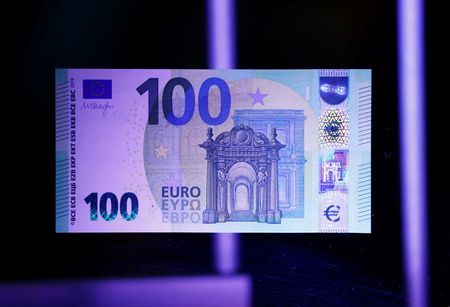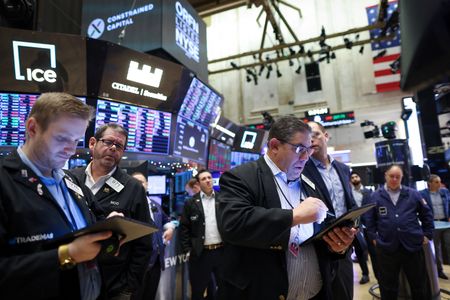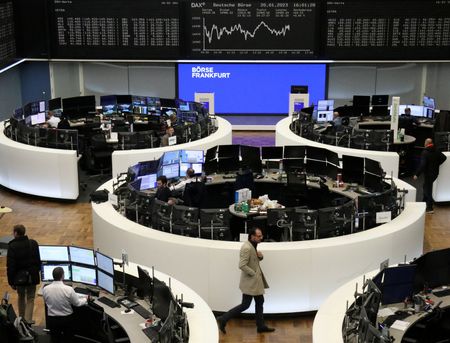 1
1 1
1



By Herbert Lash
NEW YORK (Reuters) -Global equity markets surged on Monday as easing recession fears and hopes of a less aggressive Federal Reserve buoyed sentiment, while the likelihood of more jumbo interest rate hikes in Europe pushed the euro to a nine-month peak against the dollar.
Gains in chipmakers boosted beaten-down U.S. tech stocks as the market priced in a 95.8% probability of the Fed raising rates by 25 basis points to a range of 4.50% to 4.75% on Feb. 1.
Easing fears of a recession also helped lift equities, as they did in the euro zone, despite expectations the European Central Bank will hike rates by 50 basis points both on Feb. 2 and in March, a Reuters poll showed.
The start of a big week for U.S. corporate earnings is expected to test a recent bounce in beaten-down technology and growth stocks as corporate executives discuss their outlook.
Stocks are rallying as people mistakenly believe a proximate change in Fed policy will resolve worries about higher rates and their impact on the economy, said Jason Pride, chief investment office of private wealth at Glenmede in Philadelphia.
“We are already at a point where if we stick at these numbers and hold them for a period of time, it is not good for the economy,” said Pride, referring to rates that are now “restrictive” and squeezing economic growth.
“This is like other market rallies that we’ve seen within an ongoing bear market in that you have these periods of optimism seep in because people think that the story is changing enough that the problem is gone,” he said.
The Dow Jones Industrial Average rose 0.61%, the S&P 500 gained 1.02% and the Nasdaq Composite added 1.75%, pushing gains since late last month to more than 10%.
In Europe, technology firms spearheaded gains as optimism about the eurozone economy likely avoiding a steep recession overshadowed recent hawkish remarks from ECB officials.
The pan-European STOXX 600 closed up 0.6%, as declining natural gas prices eased recession fears.
Trading was thin in Asia, as markets in China, Hong Kong, Singapore, Malaysia, South Korea and Taiwan were closed for the Lunar New Year holiday.
MSCI’s gauge of stocks across the globe gained 0.87%.
Investors are waiting for euro zone and U.S. flash PMI data on Tuesday, which are expected to show less severe economic contractions than the previous month, according to analysts polled by Reuters. The data is forecast to show more improvement in Europe than in the United States.
The difference in expectations for Fed and ECB policy led the euro to hit $1.0927 as it climbs from a two-decade low of $0.953 set in September. The single currency later pared gains against the dollar as it slid to $1.0859.
“The combination of a risk-off mood in the stock market and the divergence between the Fed and ECB allowed the euro to make new highs above 109,” said Marc Chandler, chief market strategist at Bannockburn Global Forex in New York.
Sterling traded at $1.2366, down 0.22%, while the Australian dollar, seen as a proxy for risk appetite, rose 0.80% to $0.7022. The Japanese yen weakened 0.82% at 130.65 per dollar.
Treasury yields rose to further erode a recent bond rally that some investors say was overdone in reflecting fears that the U.S. economy may soon enter a recession.
The yield on 10-year Treasury notes rose 3.7 basis points to 3.521%.
Euro zone bonds were little changed, with the benchmark 10-year German yield at 2.212%.
Crude prices rose to extend last week’s gains on the back of a stronger outlook thanks to an expected economic recovery in top oil importer China this year.
Oil prices pared gains on Monday after they rose to a seven-week high on investor optimism thanks to an expected economic recovery in top oil importer China this year.
Brent crude settled 56 cents higher at $88.19 a barrel. U.S. crude fell two cents to settle at $81.62.
U.S. gold futures settled little changed at $1,928.6.
(Reporting by Herbert Lash, additional reporting by Elizabeth Howcroft in London, Editing by Christina Fincher, Chizu Nomiyama, Sharon Singleton and Nick Zieminski)